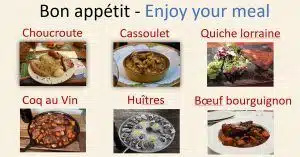General French vocabulary for dining out in restaurants
If you are living in France now or plan to visit it, learning French vocabulary for dining out in restaurants can be useful, as many places don’t have English speakers, especially if you travel out of Paris. So to avoid confusion with waiters when you want to try a restaurant in France, knowing a few phrases in French might help you.
This vocabulary is also useful for foreigners who want to work in a restaurant in France.
Below you will find explanations about restaurants and general vocabulary words and phrases that are frequently used.
Different places where you can eat in France:
Le restaurant: The restaurant is a place where people pay to sit and eat meals that are prepared and served on the premises. The word restaurant can be used for inexpensive fast food places as well as expensive luxury establishments.
Le bistrot/bistro: This is usually a small convivial place, only opening for lunch and dinner and offering a smaller menu. It is believed that the term “bistrot” actually comes from the Russian word bistro, which means “fast”. The Russian soldiers who settled in France in 1814 after the battle of Paris apparently used to say this word when the waiters were too slow to serve them. More info.
La brasserie: This is usually a big establishment that is open all day, until late in the evening, offering typical French cuisine, with many à la carte dishes and fast service. These establishments are called “brasseries” because historically they were places where beer was made on the spot, a drink that began to sparkle with success in Paris in the 19th century. The great breweries of the capital were opened by Alsatians. After the annexation of Alsace-Moselle, many of them left for Paris and did what they were already doing in their regions. More info.
Le café: This is a place where people come mainly for a drink. But it’s usually also possible to eat a snack, such as sandwiches, salads, or a croque-monsieur. More info.
La crêperie: It’s a place where you can eat delicious crêpes bretonnes.
Useful French words and phrases at the restaurant:
Aller au restaurant / To go to the restaurant:
Nous allons au restaurant ce soir. / We are going to the restaurant tonight.
Arriver au restaurant / Arrive at the restaurant:
Nous sommes arrivés au restaurant. / We arrived at the restaurant.
Réserver une table / To book a table:
J’ai réservé une table en terrasse pour 2 personnes. / I booked a table on the terrace for 2 people.
J’ai réservé une table en pour 4 personnes pour 20 heures. / I booked a table for 4 people at 8 pm.
Commander à manger / Ordering food:
J’ai commandé trois pizzas. / I ordered three pizzas. (if you order by phone or online)
But at the restaurant, for “are you ready to order”, the waiter will not ask you “Etes-vous prêt à commander”
Instead they will say:
Vous avez choisi ? / Vous avez fait votre choix ? – can be translated as “Have you chosen?”
Then when you order your meal, you can say:
Je vais prendre un steak avec des frites. / I will have a steak with french fries.
Nous allons prendre des huîtres et une soupe de poisson. / We will have oysters and a fish soup.
When you order a steak or some meat, the waiter will ask you:
Vous voulez quelle cuisson pour le steak ? / How do you want the steak to be cooked?
Then you can reply with: À point, s’il vous plaît. / medium please.
Bleu = very rare
Saignant = rare
Mi-saignant = medium rare
À point = medium
Bien cuit = well done
Dietary needs:
Est-ce que ce plat est végétarien ? / Is this dish suitable for vegetarians?
Est-ce que vous avez des plats vegan ? / Do you have vegan dishes?
Est-ce ce plat est halal ? / Is this dish halal?
Est-ce ce plat est kasher ? / Is this dish kosher?
Je suis végétarien (végétarienne if you are a woman). / I am vegetarian.
Je suis diabétique. / I am diabetic.
Je suis allergique aux cacahuètes. / I am allergic to peanuts.
Je suis intolérant (intolérante if you are a woman) au lactose. / I am lactose intolerant
When you have finished your meal:
C’était délicieux, merci. / It was delicious, thank you.
C’était très bon, merci. / It was very good, thank you.
Tout était parfait, merci. / Everything was great, thank you.
Paying for your meal:
L’addition s’il vous plaît. / The bill please.
Pouvons-nous avoir l’addition s’il vous plaît ? / Can we can get the bill please?
Vous prenez la carte ? / Can I pay by card?
Common questions in French ask in a restaurant:
Est-il possible de réserver une table pour six personnes ce soir ? / Is it possible to book a table for six tonight?
Quels plats me recommandez-vous ? / What dishes do you recommend?
Quelles sont vos spécialités ? / What are your specialties?
Vous avez des tables non-fumeurs en terrasse ? / Do you have non-smoking tables outside?
Peut-on fumer en terrasse ? / Can you smoke outside?
Vous avez un cendrier s’il vous plaît ? / Can I get an ashtray please?
Où sont les toilettes s’il vous plaît ? / Where is the restroom please?
Vous avez des toilettes pour handicapés ? / Do you have a disabled toilet?
Vous fermez à quelle heure ? / What time are you closing?
Vous ouvrez à quelle heure ? / What time are you openning?
Est-il possible d’avoir……à la place…..?
Est-il possible d’avoir de la salade à la place des frites / Is it possible to have salad instead of fries?
Dealing with problems:
If you are given the wrong food:
Excusez-moi, ce n’est pas ce que j’ai commandé. / Excuse me, I didn’t order this.
J’ai commandé un steak à point, celui-ci est saignant. / I ordered a medium steak, this one is rare.
If the cutlery or glass isn’t clean:
Puis-je avoir un autre couteau, s’il vous plaît ? / Coud I have another knife please?
Puis-je avoir une autre fourchette, s’il vous plaît ? / Coud I have another fork please?
Puis-je avoir une autre cuillère, s’il vous plaît ? / Coud I have another spoon please?
Puis-je avoir un autre verre, s’il vous plaît ? / Coud I have another glass please?
If your food isn’t hot enough:
Excusez-moi, mon plat est froid, pouvez-vous le réchauffer s’il vous plaît ?
Excuse me, my dish is cold, could you please heat it up?
If there is a mistake on your bill:
Excusez-moi, mais il y a une erreur sur l’addition, nous n’avons pas commander de champagne.
Excuse me, but there is a mistake on the bill, we did not order champagne.
French vocabulary at the restaurant:
La carte = the menu
La carte des vins = the wine menu/list
La carte des desserts = the dessert menu
Les plats à la carte = à la carte dishes
Les entrées = starters
Les plats = main meals
Les desserts = desserts
Les fromages = cheese
Les menus = set/formulas
Des couverts = cutlery
Un couteau = a knife
Une cuillère = a spoon
Une petite cuillère / une cuillère à café = a tea spoon
Une fourchette = a fork
Un verre = a glass
Un verre à bière = a beer glass
Un verre à vin = a wine glass
Une corbeille de pain = a bread basket
Une serviette = a napkin
Un cendrier = a ashtray
Un plateau = a tray
Un tablier = an apron
Des glaçons = ice/ice cubes
Du sel = salt
Du poivre = pepper
De la moutarde = mustard
De la mayonnaise = mayonnaise
Du vinaigre = vinegar
L’addition = the bill
Un pourboire = a tip
French vocabulary about drinks:
Une boisson = a drink
Un verre de vin = a glass of wine
Un verre de vin rouge = a glass of red wine
Un verre de vin blanc = a glass of white wine
Une bouteille de vin = a bottle of wine
Une bouteille de champagne = a bottle of champagne
Un quart de vin (20 cl) = a quarter of wine
Une demi bouteille de vin (37.5 cl) = a half bottle of wine
Un verre de jus d’orange = a glass of orange juice
Un verre de jus de pommes = a glass of apple juice
Un verre d’eau = a glass of water
Un café = a coffee/americano
Un expresso = an espresso
Une bouteille d’eau = a bottle of water
Une bouteille d’eau pétillante = a bottle of sparkling water
Une carafe d’eau = a jug of tap water
Une bière pression / une pression = a draft beer
Un demi = a half pint (25 cl in France)
Un panaché = a shandy
Une pinte = a pint (50 cl in France)
Un sérieux = a pint (used by students and in bars, not fancy places)
French words for professions in a restaurant:
Un serveur – Une serveuse (woman) = a waiter
Un barman – Une barmaid (woman) = a bartender
Un chef = a chef
Un sous-chef = a sous chef
Un commis de cuisine = a kitchen clerk
Un cuisinier = a cook
Un chef pâtissier = a pastry chef
Un plongeur (cleaning the dirty dishes) = a busser/busboy/busgirl
Un sommelier – Une sommelière (woman) (only in luxury establishments) = a sommelier/wine waiter
Un maître d’hôtel (only in luxury establishments) = a butler
Le patron – La patronne (woman) = the boss/owner
French popular dishes:
Below, are a few popular dishes in France, that you should try while you are over there.
Le boeuf bourguignon, a classic French beef stew.
Le cassoulet, a classic French dish, with with beans and meat (typically pork sausages, goose, duck and sometimes mutton), and pork skin.
La choucroute, it’s sauerkraut with sausages and other salted meats and charcuterie, and often potatoes.
Le coq au vin, a delicious red wine chicken stew.
Le cordon bleu = chicken cordon bleu.
Les crêpes bretonnes = is a traditional dish in Lower Brittany
Le croque monsieur, a grilled ham and cheese with béchamel sauce.
Le croque madame, same a croque monsieur, except a fried egg is added on the top of the sandwich.
Le gratin dauphinois = potatoes dauphinoise.
Les huîtres = oysters
Un jambon-beurre, the most popular sandwich in France, it is made with a baguette, butter and ham.
La quiche lorraine, the most popular quiche in France.
La soupe de poisson (popular in the South), is a food made by combining fish or seafood with vegetables and stock, juice, water, or another liquid.
You can also watch our video to learn French vocabulary at the restaurant :
We hope this lesson was helpful for you, if you have any questions, please leave a comment.




